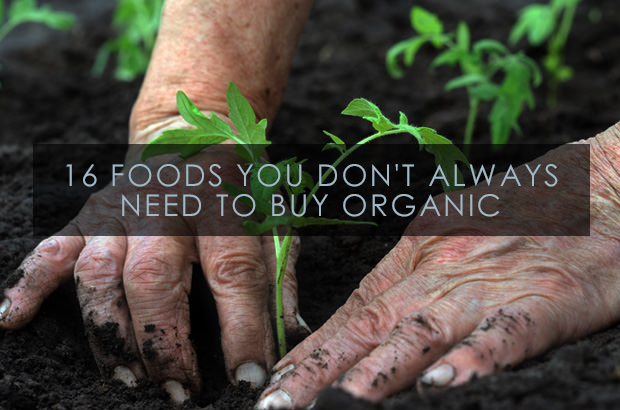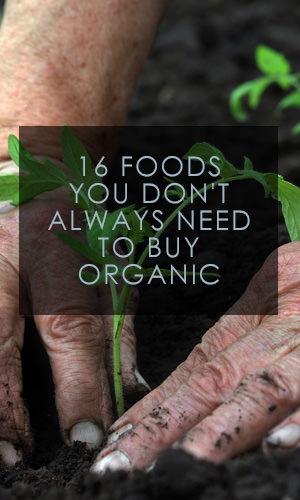
16 Foods You Don't Always Need To Buy Organic

Posted on 04 Dec, 2022

It seems like every week a new study or article is published touting the benefits of going organic -- it's better for our health and our environment. But going organic comes at a cost and it's not one all people can afford, or that all people even have access to. So where do you compromise? Read on to find out which foods are less likely to contain a significant amount of pesticide residue, and are therefore safest to purchase as conventional (i.e. non-organic), if needed.
1. Onions
 There's no need to cry over commercially grown onions from a pesticide standpoint. Onions are significantly lower in pesticide residue than other commercial produce, according to the Environmental Working Group, the leading environmental health research and advocacy organization in the U.S. In addition to enhancing the flavor of dishes, onions provide rich amounts of antioxidants. Onions also have a flavonoid called quercetin, which may help inhibit the growth of H. pylori bacteria, which underlies most stomach ulcers. Eat onions fresh on sandwiches, burgers and salads, or as part of a nutritious base for soups, sauces and stir-fries.
There's no need to cry over commercially grown onions from a pesticide standpoint. Onions are significantly lower in pesticide residue than other commercial produce, according to the Environmental Working Group, the leading environmental health research and advocacy organization in the U.S. In addition to enhancing the flavor of dishes, onions provide rich amounts of antioxidants. Onions also have a flavonoid called quercetin, which may help inhibit the growth of H. pylori bacteria, which underlies most stomach ulcers. Eat onions fresh on sandwiches, burgers and salads, or as part of a nutritious base for soups, sauces and stir-fries.
[Related: Which Is Healthier? Red Or White Onions]
2. Avocados
 Avocados are the cleanest fruit -- who knew? The Environmental Working Group tested more 3,000 pieces of produce for agricultural chemical residues only one percent of avocado samples showed any detectable pesticides. This is good news because they're loaded with essential nutrients including potassium, folate and vitamins K, B-6, E and C. Avocados are also popular for their healthy fats. So go head and add them to your smoothies for creaminess, sandwiches in place of cheese or just enjoy fresh on a salad.
Avocados are the cleanest fruit -- who knew? The Environmental Working Group tested more 3,000 pieces of produce for agricultural chemical residues only one percent of avocado samples showed any detectable pesticides. This is good news because they're loaded with essential nutrients including potassium, folate and vitamins K, B-6, E and C. Avocados are also popular for their healthy fats. So go head and add them to your smoothies for creaminess, sandwiches in place of cheese or just enjoy fresh on a salad.
3. Pineapple
 The thick skin of pineapples absorbs most of the pesticides used for cultivation, making it one of the Environmental Working Group's "Clean 15" -- 15 fruits and vegetables with the least pesticide residue. In fact, 89 percent of the pineapples tested had no resides. This is good news because they're loaded with vitamin-C-and they also contain an enzyme called bromelain which helps our bodies breakd down food and reduce inflammation, the root of many chronic diseases. Hoping to save time? Choose unsweetened frozen pineapple, which is as nutritious as fresh.
The thick skin of pineapples absorbs most of the pesticides used for cultivation, making it one of the Environmental Working Group's "Clean 15" -- 15 fruits and vegetables with the least pesticide residue. In fact, 89 percent of the pineapples tested had no resides. This is good news because they're loaded with vitamin-C-and they also contain an enzyme called bromelain which helps our bodies breakd down food and reduce inflammation, the root of many chronic diseases. Hoping to save time? Choose unsweetened frozen pineapple, which is as nutritious as fresh.
4. Asparagus
 Asparagus is among the vegetables least likely to contain pesticide residue, according to Environmental Working Group analyses. Asparagus provides rich amounts of the flavonoid rutin -- a powerful antioxidant and anti-inflammatory agent. Asparagus on the grill is a simple and delicious way to enjoy it. Try it in place of french fries, dipped in a little garlic aioli or even some creamy hummus. Brush trimmed asparagus spears with olive oil, she suggested, then grill them until tender.
Asparagus is among the vegetables least likely to contain pesticide residue, according to Environmental Working Group analyses. Asparagus provides rich amounts of the flavonoid rutin -- a powerful antioxidant and anti-inflammatory agent. Asparagus on the grill is a simple and delicious way to enjoy it. Try it in place of french fries, dipped in a little garlic aioli or even some creamy hummus. Brush trimmed asparagus spears with olive oil, she suggested, then grill them until tender.
5. Grapefruit
 Another reason having "thick skin" is a good thing. Thanks to the grapefruit’s dense peel, pesticides are kept from invading the juicy fruit. And they're also weight-friendly making them a win-win. A 2011 study found that when grapefruit or 100% grapefruit juice was consumed 20 minutes before a meals, participants ate about 30 percent less in total calories. That's huge.
Another reason having "thick skin" is a good thing. Thanks to the grapefruit’s dense peel, pesticides are kept from invading the juicy fruit. And they're also weight-friendly making them a win-win. A 2011 study found that when grapefruit or 100% grapefruit juice was consumed 20 minutes before a meals, participants ate about 30 percent less in total calories. That's huge.
6. Mangoes
 Mangos can help satisfy your sweet tooth without excessive calories or pesticides. Like their friend the grapefruit, their dense peel protects their insides from toxic chemicals used for production. One cup of mango has just 100 calories and it stocked with vitamin A and fiber. Serve mango fresh or pureed with ice and other desired fruits as a tasty, nutritious smoothie. For a healthy dessert, top a bowl of fresh mango cubes with a dollop of Greek yogurt.
Mangos can help satisfy your sweet tooth without excessive calories or pesticides. Like their friend the grapefruit, their dense peel protects their insides from toxic chemicals used for production. One cup of mango has just 100 calories and it stocked with vitamin A and fiber. Serve mango fresh or pureed with ice and other desired fruits as a tasty, nutritious smoothie. For a healthy dessert, top a bowl of fresh mango cubes with a dollop of Greek yogurt.
7. Kiwi Fruit
 If you're given the choice between a non-organic nectarine, peach or kiwi, you may want to opt for the kiwi. While nectarines and peaches fall within the Environmental Working Group's top 10 highest pesticide culprits, kiwis fall in the top 10 most "clean." Though kiwis have a thin skin, the fruit is seldom sprayed with pesticides. The rich fiber helps move things along and keeps your appetite in check.
If you're given the choice between a non-organic nectarine, peach or kiwi, you may want to opt for the kiwi. While nectarines and peaches fall within the Environmental Working Group's top 10 highest pesticide culprits, kiwis fall in the top 10 most "clean." Though kiwis have a thin skin, the fruit is seldom sprayed with pesticides. The rich fiber helps move things along and keeps your appetite in check.
8. Mushrooms
 Mushrooms are some of the least pesticide-ridden veggies. They're also nutrient powerhouses. And the darker the mushroom, the more flavorful. Sauté or grill mushrooms at a high heat for the most intense flavor. Add small mushrooms to soups, salads, curries and casseroles. Large mushrooms, such as portobellos, provide fat-free vegetarian alternatives to hamburger patties.
Mushrooms are some of the least pesticide-ridden veggies. They're also nutrient powerhouses. And the darker the mushroom, the more flavorful. Sauté or grill mushrooms at a high heat for the most intense flavor. Add small mushrooms to soups, salads, curries and casseroles. Large mushrooms, such as portobellos, provide fat-free vegetarian alternatives to hamburger patties.
9. Papayas
 Papaya - ya! About 80 precent of the papaya tested in the study done by EWG was pesticide-free. The fruits vibrant orange color is an indication of it's nutritional punch. One-half of a small papaya supplies 80 percent of your daily recommended intake of vitamin C, along with rich amounts of potassium, folic acid, beta-carotene and fiber. If you're concerned about genetically modified foods, you may want to go organic for this one -- a small portion of the papaya grown in the U.S. comes from GE seedstock.
Papaya - ya! About 80 precent of the papaya tested in the study done by EWG was pesticide-free. The fruits vibrant orange color is an indication of it's nutritional punch. One-half of a small papaya supplies 80 percent of your daily recommended intake of vitamin C, along with rich amounts of potassium, folic acid, beta-carotene and fiber. If you're concerned about genetically modified foods, you may want to go organic for this one -- a small portion of the papaya grown in the U.S. comes from GE seedstock.
10. Sweet Peas
 Sweet peas have very little pesticide residue and are safe to buy as conventional (i.e. non-organic), according to the Environmental Working Group. One cup of sweet peas supplies a whopping 14 grams of fiber, making them one of the highest-fiber veggies. The Institute of Medicine recommends at least 25 grams of fiber per day per women and 38 grams for men under the age of 50 -- yet Americans consume an average of 15 daily grams. To add fiber, protein and a slew of other essential nutrients to your diet, incorporate frozen peas into chili, soups and casseroles.
Sweet peas have very little pesticide residue and are safe to buy as conventional (i.e. non-organic), according to the Environmental Working Group. One cup of sweet peas supplies a whopping 14 grams of fiber, making them one of the highest-fiber veggies. The Institute of Medicine recommends at least 25 grams of fiber per day per women and 38 grams for men under the age of 50 -- yet Americans consume an average of 15 daily grams. To add fiber, protein and a slew of other essential nutrients to your diet, incorporate frozen peas into chili, soups and casseroles.
11. Cantaloupe
 Again, that thick skin comes in handy. Pesticide residue are unable to get past the cantaloupe's tough peel, protecting its juicy insides, making it one of Environmental Working Group’s “Clean 15.” To ripen cantaloupe at home, leave at room temperature. Once ripe, add diced cantaloupe to brown rice and polenta for added color, flavor and nutrients.
Again, that thick skin comes in handy. Pesticide residue are unable to get past the cantaloupe's tough peel, protecting its juicy insides, making it one of Environmental Working Group’s “Clean 15.” To ripen cantaloupe at home, leave at room temperature. Once ripe, add diced cantaloupe to brown rice and polenta for added color, flavor and nutrients.
12. Sweet Potatoes
 Another reason to get sweet on sweet potatoes: They're less likely to contain high levels of pesticide residue compared to other produce. Loaded with betacarotene, potassium, vitamin C and fiber, they provide a source of satisfying, natural sweetness without excess calories and sugar.
Another reason to get sweet on sweet potatoes: They're less likely to contain high levels of pesticide residue compared to other produce. Loaded with betacarotene, potassium, vitamin C and fiber, they provide a source of satisfying, natural sweetness without excess calories and sugar.
13. Eggplant
 An entire cup of cooked, cubed eggplant provides a mere 33 calories, along with valuable amounts of satiating fiber. Many of the pesticides used in producing eggplant do not remain on the skin of the plant, earning it a place on the Environmental Working Group’s “Clean 15” list and making eggplant a safer choice than high-pesticide vegetables. For a tasty dish, grill eggplant slices brushed with olive oil until the outsides are golden-brown. Then add desired seasoning, such as basil, oregano, garlic or a light dusting of sea salt.
An entire cup of cooked, cubed eggplant provides a mere 33 calories, along with valuable amounts of satiating fiber. Many of the pesticides used in producing eggplant do not remain on the skin of the plant, earning it a place on the Environmental Working Group’s “Clean 15” list and making eggplant a safer choice than high-pesticide vegetables. For a tasty dish, grill eggplant slices brushed with olive oil until the outsides are golden-brown. Then add desired seasoning, such as basil, oregano, garlic or a light dusting of sea salt.
14. Cabbage
 Leafy vegetables need not be green to be nutritious. Whether white, red or purple, cabbage provides significant amounts of nutrients, including vitamin C and fiber, and markedly low calories, or about 13 per cup of cooked cabbage. Like kale, cabbage is a cruciferous vegetable that may guard against some types of cancer including colorectal cancers according to a recently published study. Unlike kale, which makes the Environmental Resource Group’s list of high-pesticide items, cabbage tends to contain little toxic residue.
Leafy vegetables need not be green to be nutritious. Whether white, red or purple, cabbage provides significant amounts of nutrients, including vitamin C and fiber, and markedly low calories, or about 13 per cup of cooked cabbage. Like kale, cabbage is a cruciferous vegetable that may guard against some types of cancer including colorectal cancers according to a recently published study. Unlike kale, which makes the Environmental Resource Group’s list of high-pesticide items, cabbage tends to contain little toxic residue.
15. Watermelon
 The flavor isn’t the only sweet attribute of watermelon. The thick outer casing provides protection from pesticides in the soil. Watermelon may also help soothe those sore muscles and keep your ticker healthy. To keep your calorie intake and weight in-check, swap out high-calorie, low-nutrient sweets in your diet with sweet fruits, such as watermelon. Watermelon also makes a tasty addition to smoothies.
The flavor isn’t the only sweet attribute of watermelon. The thick outer casing provides protection from pesticides in the soil. Watermelon may also help soothe those sore muscles and keep your ticker healthy. To keep your calorie intake and weight in-check, swap out high-calorie, low-nutrient sweets in your diet with sweet fruits, such as watermelon. Watermelon also makes a tasty addition to smoothies.
16. Cauliflower
 This vegetable is so on trend right now as a low-carb alternative to potatoes, rice and the like. The good news is cauliflower is less likely to hold pesticides so if you're on a budget, you can go conventional with this one.
This vegetable is so on trend right now as a low-carb alternative to potatoes, rice and the like. The good news is cauliflower is less likely to hold pesticides so if you're on a budget, you can go conventional with this one.
What Do YOU Think?
Do you buy any of these 16 fruits and vegetables? Did you know that they are OK to buy conventional (i.e. non organic)? Let us know if you were surprised by any of them and also share with us your favorite way of preparing them. Are you aware of the list of 20 foods you should always buy organic? What are your thoughts on organic food? Leave a comment below and let us know.
Our Favorite Books On Eating Healthy

by John Berardi

by Michael Pollan

by Dr. Alejandro Junger

by Michael Greger
 20 Priceless Moments On The Road To Fitness
20 Priceless Moments On The Road To Fitness Do Beer And Running Mix?
Do Beer And Running Mix? The Minimum Amount You Can Strength Train And Still See Results
The Minimum Amount You Can Strength Train And Still See Results How To Do The Perfect Push-Up
How To Do The Perfect Push-Up










